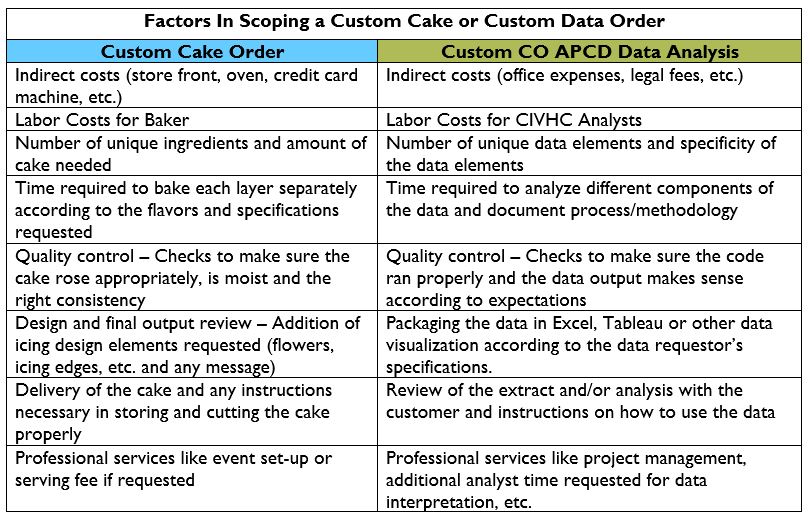![]() As discussed in our first Plaintalk Blog, administrating the CO APCD takes a great deal of processing, quality control, and analytic capability. Getting claims information in the door in the correct format and processing them to a point where the information is useful for reporting is a heavy lift and costs millions of dollars annually. A substantial part of the annual operating expenses include generating the public reports and data available on this site, but they also include costs to license non-public custom data to organizations working to advance the Triple Aim of better health, better care, and lower cost.
As discussed in our first Plaintalk Blog, administrating the CO APCD takes a great deal of processing, quality control, and analytic capability. Getting claims information in the door in the correct format and processing them to a point where the information is useful for reporting is a heavy lift and costs millions of dollars annually. A substantial part of the annual operating expenses include generating the public reports and data available on this site, but they also include costs to license non-public custom data to organizations working to advance the Triple Aim of better health, better care, and lower cost.
Preparing CO APCD data for non-public, custom requests is a completely different process than getting it ready for public reporting. So, what info is included in a custom request and how does CIVHC pull it together?
First, we work with potential data requestors one-on-one to make sure we fully understand the question(s) they are trying to answer or problem(s) they are trying to solve with the data. If the CO APCD is a good fit for their needs, we then help them fill out an application, and discuss formatting and delivery options. Our compliance and analyst team can then scope out the amount of hours it will take to develop and deliver the analysis according to the established specifications.
The process is similar to ordering a customized cake for a special event. The cake shop would first need to understand the client’s goals by asking questions such as, “What event is being celebrating?”, “How many will need to be served?”, and “When does the event take place?” If they can meet those basic needs, they would continue by discussing potential designs and may even sketch out an idea or show examples before providing an estimate for the final data access fee.
The price for a custom cake (or the data access fee custom data analysis) depends on a number of factors in addition to basic labor and overhead costs. These additional factors are outlined in the table below.
Though costs can vary significantly based on the information requested, each request is scoped in a similar manner, and we try our best to meet the budgetary needs of the requestor while covering our costs. Each data request is unique and therefore varies in the time it takes to create and fulfill it, and the fee associated. The Colorado General Assembly created the CO APCD Scholarship Fund, which has been leveraged by many small nonprofits, academic and research institutions, and Colorado State Agencies to help support the cost of the data access fees.
CIVHC is proud to say that data access fees have come down in cost each year since the CO APCD data warehouse became available in 2013. We are also developing a series of customizable “standard” reports that do not involve as much delivery and development time and will be available for less than typical custom reports.
We continually seek innovative ways to expand access to data while ensuring the CO APCD remains a viable resource. As mentioned, the CO APCD Scholarship program has been instrumental in assisting non-profits, researchers and state agencies access the data. We are also incredibly grateful to local private foundations like The Colorado Trust, the Colorado Health Foundation, Rose Community Foundation and others, without whom the CO APCD and current capabilities would not be possible.

